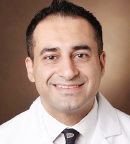Reports of rare, but in some cases fatal, cardiac complications when the checkpoint inhibitors ipilimumab (Yervoy) and nivolumab (Opdivo) are used in combination should be taken seriously but should not scare patients away from potentially life-saving drugs, according to Javid J. Moslehi, MD. Dr. Moslehi is Director of Cardio-oncology at Vanderbilt School of Medicine, Nashville; author of a recent article on the cardiovascular toxicities of targeted cancer therapies; and a leading author of a case report on two patients who developed fatal myocarditis after treatment with ipilimumab and nivolumab. Both articles were published in The New England Journal of Medicine.1,2
Dr. Moslehi told The ASCO Post that although cardiac complications are increased when ipilimumab and nivolumab are used in combination, he believes that the cardiac complications are “a class effect” of checkpoint inhibitors. Such complications are, however, rare, with myocarditis occurring in less than 1% of patients.
Making an informed decision about the use of checkpoint inhibitors will require oncologists and cardiologists, as well as patients, to become more aware of the risks and benefits of these agents as their toxicity profiles become clearer. Cancer survivors who have been treated with checkpoint inhibitors, as well as other cancer therapies, such as radiation, anthracyclines, trastuzumab (Herceptin), and androgen-deprivation therapy, should also be aware of their long-term risks of cardiovascular disease and how to help prevent it.
As Simple as ABCDE
Dr. Moslehi and his cardio-oncology colleagues have proposed a simple “ABCDE approach” to prevent cardiovascular disease in cancer survivors. “This approach may have the added benefit of protecting patients from the recurrence of cancer,” he wrote in the journal article on cardiovascular toxicities.1 With the ABCDE approach, A stands for awareness, assessment, and aspirin; B stands for blood pressure control; C stands for cholesterol lowering and cigarette cessation; D stands for diet, dose of chemotherapy, and diabetes management; and E stands for exercise and echocardiography.
This approach [ABCDE method to prevent cardiovascular disease in cancer survivors] may have the added benefit of protecting patients from the recurrence of cancer.— Javid J. Moslehi, MD
Tweet this quote
“Patients diagnosed with cancer may have a primary care physician, but once they are getting cancer treatment, the oncologist becomes the primary care physician,” Dr. Moslehi stated. Afterward, “they go back to the primary care physician, who can be overwhelmed with seeing the patient for the first time in 3 years.” The ABCDE approach, he said, makes it easier for cancer survivors and their primary care physicians to take steps to prevent cardiovascular disease and “may have the added benefit of protecting patients from the recurrence of cancer.”
The ABCDE approach grew out of Dr. Moslehi’s experience on the National Comprehensive Cancer Network® (NCCN) survivorship committee and its focus on “how do we prevent cardiovascular disease in all cancer survivors, be they patients with breast cancer, prostate cancer, chronic myeloid leukemia, or a growing number of melanoma patients we consider survivors? That is the emphasis we have on the NCCN panel and within the cardiology community in general,” he revealed, “and it is time to apply that to the 15 million cancer survivors in the United States.” ■
Disclosure: Dr. Moslehi has been a consultant or served on an advisory board for Novartis, Pfizer, Bristol-Myers Squibb, Takeda/Millennium, Ariad, Acceleron, Vertex, Incyte, Rgenix, Acceleron, Verastem, Pharmacyclics, StemCentRx, and Heat Biologics.
References


